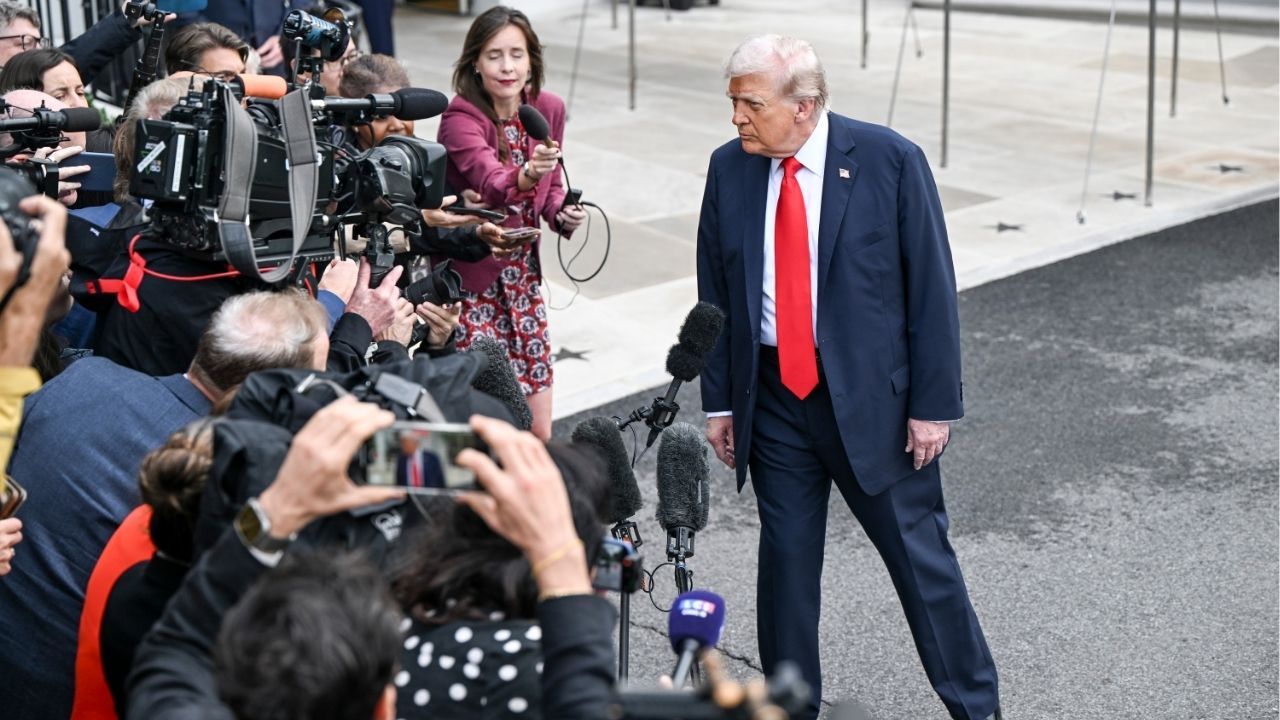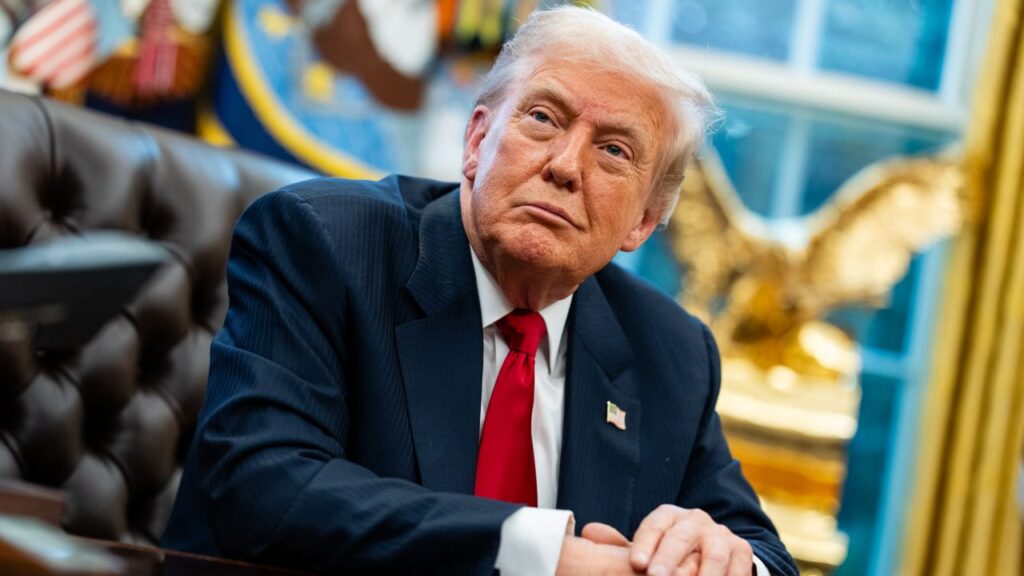President Donald Trump speaks to reporters as he departed the White House en route to Joint Base Andrews, bound for a trip to Britain, Sept. 16, 2025. Draft legislation is circulating at the White House and on Capitol Hill that would hand President Trump sweeping power to wage war against drug cartels he deems to be “terrorists,” as well as against any nation he says has harbored or aided them, according to people familiar with the matter. (Kenny Holston/The New York Times)

- Draft bill could give Trump broad authority to attack drug cartels and nations harboring them.
- Legal experts warn strikes on suspected smugglers may violate U.S. and international law.
- Law modeled on post-9/11 authorization; lacks clear congressional oversight or geographic limits.
Share
|
Getting your Trinity Audio player ready...
|
WASHINGTON — Draft legislation is circulating at the White House and on Capitol Hill that would hand President Donald Trump sweeping power to wage war against drug cartels he deems to be “terrorists,” as well as against any nation he says has harbored or aided them, according to people familiar with the matter.
A wide range of legal specialists have said that U.S. military attacks this month on two boats suspected of smuggling drugs in the Caribbean Sea were illegal. But Trump has claimed that the Constitution gave him the power he needed to authorize them.
Not Clear Who the Author Is
It was not clear who wrote the draft congressional authorization or whether it could pass the Republican-led Congress, but the White House has been passing it around the executive branch.
The broadly worded proposal, which would legally authorize the president to kill people he deems narco-terrorists and attack countries he says helped them, has set off alarm bells in some quarters of the executive branch and on Capitol Hill, according to people who spoke on the condition of anonymity about sensitive internal deliberations.
Three people familiar with the matter said that Rep. Cory Mills, R-Fla., a combat veteran who sits on the Armed Services Committee, was involved in developing the draft. Mills, a staunch Trump ally, declined to comment on the potential legislation or his role. Karoline Leavitt, the White House press secretary, declined to comment, citing a policy against discussing “drafts that may or may not be circulating.”
An administration official, speaking on the condition of anonymity to discuss internal matters, said the draft originated with a member of Congress who had asked for technical assistance in improving it. The official portrayed its circulation for input by executive branch agencies as a routine courtesy that should not be interpreted as support for the idea.
Measure Comes Amid Escalating Washington Debate
The measure has emerged amid an escalating debate in Washington over the president’s war-making power and Congress’ role in authorizing the use of U.S. military force, after the Trump administration opened a deadly campaign against the boaters.
The two boat attacks — killing what Trump has said were 14 people he accused of smuggling drugs toward the United States — were the latest in a series of military operations the president has taken without congressional authorization, raising constitutional concerns among some lawmakers in both parties, who say their branch should play a greater role in such decisions.
Critics have also said that Trump and Defense Secretary Pete Hegseth have given illegal orders, causing Special Operations troops to target civilians — even if they are suspected of crimes — in apparent violation of laws against murder.
The U.S. Coast Guard, with help from the Navy, has long treated drug trafficking as a law enforcement problem, interdicting boats and arresting their crews if a search confirmed suspicions of drug smuggling. Regular forces repeated that approach with a Venezuelan fishing boat last week, releasing its crew after the suspicions apparently proved to be inaccurate.
But the administration has insisted that Trump has legal authority, under his constitutional power as commander in chief, to direct Special Operations forces to instead summarily kill those suspected of drug running as if they are combatants on a battlefield. Citing the roughly 100,000 overdose deaths of Americans each year, the administration has invoked self-defense and the law of armed conflict.
Congress Has Not Authorized Armed Conflict With Drug Cartels
Congress has not authorized any armed conflict with drug cartels. The draft legislation, which the White House Office of Management and Budget has circulated within the executive branch for comment, would address that potential weakness in the administration’s argument — at least as a matter of domestic law.
Following the first boat strike, on Sept. 2, Democrats and some Republicans expressed concern about the White House’s legal basis for the attack, even as administration officials including Secretary of State Marco Rubio, who is also Trump’s national security adviser, said there would be more to come.
Sen. Adam Schiff, D-Calif., said he would introduce a measure under the War Powers Resolution, a 1973 law aimed at checking a president’s power to wage war without the consent of Congress, that directs the executive branch to curtail the operation.
Before Schiff did so, Trump on Monday announced a second deadly strike against what he described as a Venezuelan boat in international waters. Together with Sen. Tim Kaine, D-Va., Schiff on Friday morning introduced the measure, which would direct the administration to end any additional planned strikes and reassert congressional authority over the use of military force.
The resolution also states that Congress has received insufficient information about the vessels, their threat level or the legal basis for using force against them. It also reaffirms a commitment to funding intelligence gathering, diplomatic tools and counternarcotics efforts to fight drug trafficking.
Republicans Discuss Ways to Shore Up Trump’s Authority
Some Republicans have discussed ways to shore up Trump’s legal authority. Mills, who served during conflicts in Kosovo and Iraq, advised the Pentagon in Trump’s first term before launching his bid for Congress in 2021 and winning election the following year.
The draft, which was described to The New York Times, would cover groups that the executive branch designates as terrorists and that Trump determines, in consultation with Congress, have either trafficked in drugs to finance terrorist activities or used terrorist tactics to advance narcotics-related enterprises. Nations that harbored such groups would also be covered.
It does not define what constitutes sufficient consultation with Congress or what counts as terrorist tactics.
Such an authorization would amount to giving Trump “a blank check,” said Jack Goldsmith, a Harvard Law School professor and a former senior Justice Department official in the Bush administration.
“It’s insanely broad,” Goldsmith said. “This is an open-ended war authorization against an untold number of countries, organizations and persons that the president could deem within its scope.”
Goldsmith said that Congress had the authority, as a matter of domestic law, to authorize the use of military force against nonstate groups. But deliberately killing civilians who are not directly participating in hostilities — even those suspected of being criminals — would still violate international law, he added.
The draft appears to be modeled on the broad authorization that Congress granted President George W. Bush after the Sept. 11, 2001, attacks. Like that one, it does not name a specific enemy — empowering the president to decide whom to target — and is not confined to geographical limits.
—
This article originally appeared in The New York Times.
By Charlie Savage and Robert Jimison/Kenny Holston
c. 2025 The New York Times Company
RELATED TOPICS:
Categories




















